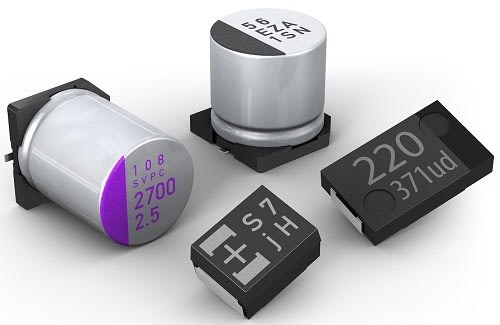Polymer Capacitors
Follow articleHow do you feel about this article? Help us to provide better content for you.
Thank you! Your feedback has been received.
There was a problem submitting your feedback, please try again later.
What do you think of this article?
Capacitors may seem simple enough, but specifying them has actually grown more complex in recent years. The reason why comes down to freedom of choice. The universe of capacitors has expanded greatly over the past few years, in large part because of capacitor designs that take advantage of advances in conductive polymers.
These advanced capacitors sometimes use conductive polymers to form the entire electrolyte, or the conductive polymers can be used in conjunction with a liquid electrolyte in a design known as a hybrid capacitor. Either way, these polymer-based capacitors offer a performance edge over conventional electrolytic and ceramic capacitors when it comes to:
• Electrical characteristics.
• Stability.
• Longevity.
• Reliability.
• Safety.
• Life cycle cost.
To complicate matters further, polymer capacitors come in four main varieties including the hybrid. Each type has different electrolytic and electrode materials and packaging. Each construction method offers advantages for different applications and markets. For a capacitor novice like myself, this seems almost unbearably complex.
But, is it worth the headache? Why choose polymer? Well, leaders in the field Panasonic have published a hugely useful white paper that explains everything the average engineer will need to know about polymer and hybrid capacitors. You can download this document below. and whilst it might not make you an industry expert, it will take the mystery out of polymers and will let you design with confidence.
Ultimately, polymer capacitors are a real alternative to traditional construction methods. They offer advantages over traditional capacitors in frequency characteristics, stability and safety, and in fact some of these features can make a real difference. For example, if capacitance is not a designer's major concern, the ultra-low ESR (equivalent series resistance) means that a single polymer capacitor could do the job of as many as 10 instances of a traditional type. Really.
This kind of benefit saves the engineer money, assembly time and space. And who wouldn't want that?
To learn more, here is a video of when we were joined by Craig from Vishay where he explained some of the key benefits of polymer technology:
If you want to investigate the world of polymer capacitors further, RS Components has much to offer in a range of technologies. Here are some of the highlights - click on the manufacturer's logo to buy now:




Comments